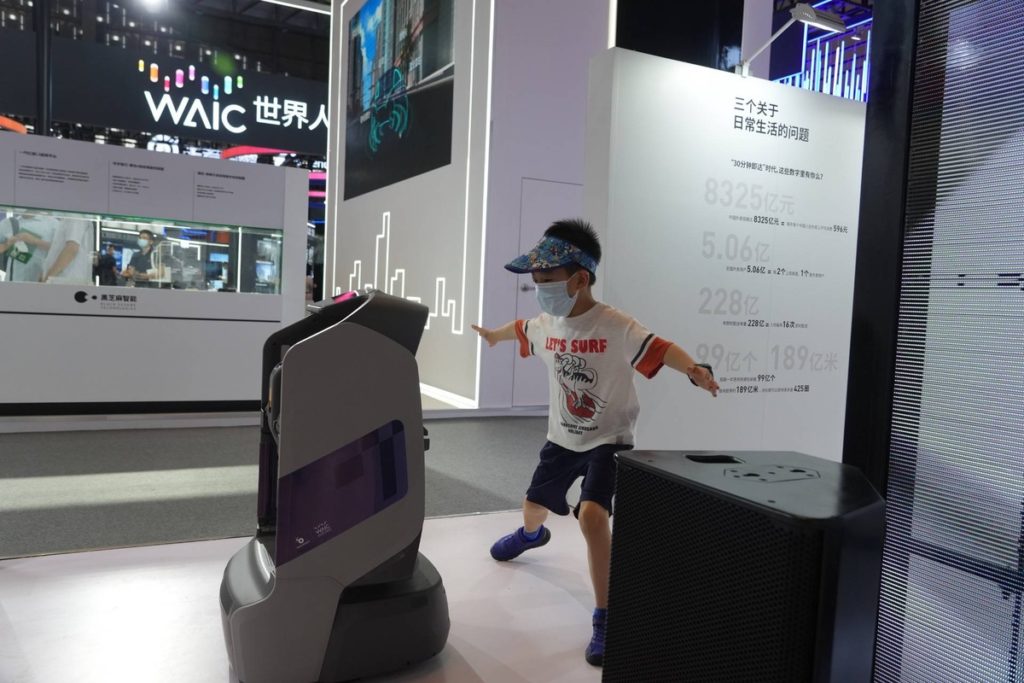Ministry unveils grand vision for tech-enabled future at a global event in key metro
China welcomes multinational corporations seeking to establish artificial intelligence research and development facilities in the country, said Xiao Yaqing, minister of industry and information technology, on Thursday.
Concerted endeavors by all the parties concerned hold the key to accelerated transition into the “intelligent era”, Xiao said.
He was addressing the gathering at the opening of 2021 World Artificial Intelligence Conference in Shanghai. Xiao said China should join hands with all the parties concerned to strengthen AI-related technology innovation and forge cooperation.
“We encourage and support R&D institutions and enterprises to strengthen exchanges,” Xiao told a packed audience comprising, among others, tech luminaries and business executives.
Such joint efforts can help “overcome technological difficulties and contribute our wisdom in the accelerated march into the intelligent era”, he said.
China ranks first in terms of the number of AI-related invention patents, Xiao said. The country has formed an entire industrial chain and application scenarios, and has made remarkable progress in areas like image recognition and voice recognition.
To further advance AI’s development, Xiao encouraged all sides to leverage rich data and application scenarios generated by the world’s largest consumer and application market, and called for the co-creation of high-quality AI governance to ensure the safe development of the promising sector.
Shanghai, which is looking to emerge as China’s AI highland with global influence, will serve as a “testbed and barometer” for global AI development, said Li Qiang, the city’s Party secretary, at the event.
To reach its goal, Shanghai will strive to build a global innovation network that will foster an open-source ecosystem, encourage indigenous innovation, forge “super scenarios” for AI to gain ground, and embark on safe and agile governance of AI.
There is no doubt that China leads the way in AI, said Allan Gabor, president of Merck China, a prominent science and technology company that set up a booth at the event venue.
Merck is showcasing a variety of AI-based solutions in life sciences and electronics segments where AI can be used to enhance customer health and facilitating smaller but more powerful chips in a data-driven world.
“We set up this booth to demonstrate what we can achieve through AI in each of our business sectors and how we embedded into the ecosystem in China through our innovation hubs,” Gabor said.
An investment of 1 billion yuan ($150 million) in China’s electronics field could lay the foundation “for the next wave of artificial intelligence growth and innovation in China”, he said.
As part of the event, pharmaceutical company AstraZeneca is presenting its series of open-source innovation platforms dubbed CCiC in multiple cities with local partners.
It is also showcasing 10″AI+Healthcare” application scenarios like intelligent outbound follow-up calls at community hospitals.
“As a ‘localized’ multinational pharmaceutical company adopting a ‘localization’ strategy in China, AstraZeneca has actively supported the government strategy of developing AI industry and built the Medical Healthcare AI Innovation Center in Shanghai,” said Leon Wang, executive vice-president international of Astra-Zeneca who doubles up as president of its China operations.
“We aim to accelerate the construction of an innovation platform for AI in healthcare, and drive the incubation of more ‘AI+Healthcare’ solutions.”
Tencent will join hands with the National Astronomical Observatories to find pulsars and explore the universe using AI-enabled technologies, said Pony Ma, the internet giant’s chairman and CEO.
The star-exploration plan will leverage Tencent’s computer vision technology and computing might, he said.
Data generated by China’s Five-hundred-meter Aperture Spherical Radio Telescope (FAST) in one week are equivalent of approximately 30 million signal images, which could take about one year for humans to process with naked eyes. But AI pre-screening offered by Tencent can trim that process to just three days.
